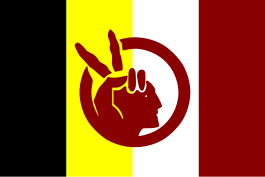American Indian Movement
| American Indian Movement | |
|---|---|
| Participant in the Red Power movement | |

Flag of the American Indian Movement
|
|
| Active | 1968–present |
| Ideology |
Anti-Racism Native American civil rights |
| Groups | American Indian Movement of Colorado |
| Leaders | Founders: Dennis Banks Clyde Bellecourt Vernon Bellecourt Former: Russell Means |
| Area of operations | United States |
| Part of | Rainbow Coalition |
| Allies | Brown Berets |
| Opponents | United States government |
| Battles and wars | Wounded Knee Incident and Pine Ridge Indian Reservation violence |
The American Indian Movement (AIM) is an American Indian advocacy group in the United States, founded in July 1968 in Minneapolis, Minnesota. AIM was initially formed to address American Indian sovereignty, treaty issues, spirituality, and leadership, while simultaneously addressing incidents of police harassment and racism against Native Americans forced to move away from reservations and tribal culture by the 1950s-era enforcement of the U.S. federal government-enforced Indian Termination Policies originally created in the 1930s. "As independent citizens and taxpayers, without good education or experience, most 'terminated' Indians were reduced within a few years to widespread illness and utter poverty, whether or not they were relocated to cities," from the reservations. The various specific issues concerning Native American urban communities like the one in Minneapolis (disparagingly labeled "red ghettos") include unusually high unemployment levels, overt and covert racism, police harassment and neglect, epidemic drug abuse (mainly alcoholism), crushing poverty, domestic violence and substandard housing. AIM's paramount objective is to create "real economic independence for the Indians."
While government-directed Indian termination policies were enforced during the Eisenhower administration, hastily executed uranium mining contracts to permit it (even sanctioning it as "economic progress") preceded the imposition of unprecedented-scale government-sanctioned commercial uranium extraction operations from various parts of traditional Indian western North American tribal lands (not so named under the ancient land-use and resource-sharing ways of indigenous former inhabitants) and the uranium mining was permitted. However, the uranium mining contracts were signed without tribal permissions.
...
Wikipedia
